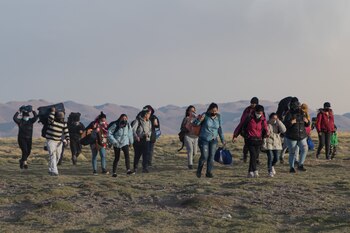
The Chilean government lifted on Friday the state of emergency that began in February to control irregular migration in four provinces in the north of the country, but will maintain military deployment in the area.
In force since February 16 and extended twice, the state of emergency allowed the deployment of soldiers and more police on the northern border with Bolivia and Peru, where thousands of migrants, mainly Venezuelans, cross on foot for inhospitable clandestine deadlines to the Chilean provinces of Arica, Parinacota, Tamarugal and El Loa.
“The state of emergency ends, but the government will keep Decree 265 in force, which allows the maintenance of all police personnel, but also all personnel of the Armed Forces and all the support equipment for border control,” said Manuel Monsalve, Undersecretary of the Interior.
Military deployment will maintain collaboration with civil and police authorities to control activities that are linked to the smuggling of migrants, and drug trafficking and transnational organized crime, according to Decree 265.
The end of the state of emergency coincides with the announcement of the opening since May 1 of the borders with Argentina, Bolivia and Peru that remained closed due to restrictions due to the covid-19 pandemic.
In addition, since last Thursday, sanitary measures to enter Chile have been relaxed, such as not requesting the PCR exam or requesting the approval of vaccines.

Many poor migrants who enter Chile irregularly settle to live in precarious camps on beaches and squares in the north of the country, which has caused discomfort to some of the local population. In Iquique and other cities there have been protests in rejection of the massive presence of foreigners.
A new migration law allows the Chilean authorities to “redirect” to the border all migrants who have entered irregular shape to the country.
This regulation was enacted in April last year. The one in 1975 was in force and it was one of the observations made by the political class in order not to be able to deal with the entry of migrants through illegal passage into Chile.
The changes made to this law are: ensuring access to defense for foreigners who are detained when reviewing their documents, broadening the spectrum of immigrants who will be able to access family reunification, eliminating the requirement that citizens of other countries who do not have a hotel reservation must have a letter of notarized invitation of a resident and the removal of the obligation for public officials to report violations committed by foreigners, are some of the modifications between the withdrawn text and the re-entered text.
(With information from AFP)
Keep reading:
Últimas Noticias
Debanhi Escobar: they secured the motel where she was found lifeless in a cistern
Members of the Specialized Prosecutor's Office in Nuevo León secured the Nueva Castilla Motel as part of the investigations into the case

The oldest person in the world died at the age of 119
Kane Tanaka lived in Japan. She was born six months earlier than George Orwell, the same year that the Wright brothers first flew, and Marie Curie became the first woman to win a Nobel Prize

Macabre find in CDMX: they left a body bagged and tied in a taxi
The body was left in the back seats of the car. It was covered with black bags and tied with industrial tape
The eagles of America will face Manchester City in a duel of legends. Here are the details
The top Mexican football champion will play a match with Pep Guardiola's squad in the Lone Star Cup

Why is it good to bring dogs out to know the world when they are puppies
A so-called protection against the spread of diseases threatens the integral development of dogs




